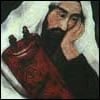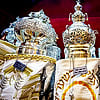
Rabbi Chizkiya said in the name of Rabbi Simon bar Zavdi:
"The Torah that you are learning in the world the way it is now is empty breath compared to the Torah of the messianic era."
(Midrash Rabbah, Kohelet 2:1)
"Every wisdom that ever was and ever will be," writes Nachmanides at the outset of his classic biblical commentary, "is embedded in the Five Books of Torah that Moses wrote. All of it was received in the ultimate enlightened state, directly from the Almighty."
So here we have the ultimate wisdom being called "empty breath." The term implies that the core is missing, the essence is not there. Everything is there, they are telling us, but the essence.
This is very strange: We got the whole thing, but we still don't get it.
I didn't get this either, until a taxi driver explained it to me.
My plane was scheduled to leave from La Guardia in half an hour and the taxi was fifteen minutes away. Then the thunderstorm began. Traffic wasn't moving.
"Don't worry," my taxi driver turned to explain to me in a thick Middle Eastern accent. "You're plane's not going nowhere either. Not La Guardia. No luck. Thunder and they stay on the ground." Then some epithet I didn't quite get the meaning of.
He flipped up the cover of his cell phone. In a second: "Listen, my dear beloved wife, I will be late for dinner. Maybe around eight o'clock. Have dinner ready. I'm working all day. I am tired and I want to eat."
Pause.
"What would I like? What do you mean, what would I like?!"
"This is why I married you? How long are we married? For this, I gave your father two camels, five sheep and a herd of goats? And you have to ask me what do I like for dinner? I don't understand. I am married to you! Married!"
"Yes!" I thought. "This is it!"
In this world we were betrothed with His Torah to be His, as it is written, "And I will sanctify you to me forever."
But not until the times of Mashiach will the marriage be consummated, as it says, "For your Maker will be your husband."
(Midrash Rabbah, Exodus, end of chapter 15)
Since the Torah was given, we are like the bride betrothed to her beloved, kosher-style: she talks a lot with him, mainly by phone and in hotel lobbies. She finds out everything about him — what he likes and what he does not like, his goals in life, his sense of humor and his moods.
But she does not have him. Not until the day of the chuppah — and then they become one. Then, as Rabbi Yitzchak Luria, the Holy Ari, explains, his spirit enters her and hers enters him; she provides him with the essence of who she is and the essence of his innermost mind is transmitted into her.
Then they are one. She doesn't need to hear from him what he wants for dinner. She knows even better than he does.
Okay, maybe down here the magic doesn't always kick in immediately. But in the cosmic scene, between us and Him, that's what marriage is all about:
Right now, we know what we are to do, how we are to do it, what we must not do and how to avoid it. But when it comes to why, we know very, very little. Even the most esoteric reasons of the Kabbalah, taught the Ari, are not even a drop from the ocean, not even a faint glimmer of the endless inner wisdom that lies behind each mitzvah.
We have reasons, but we don't touch the essence. When we ask, "Why does He want us to wear those strange black leather boxes and dangle woolen strings from a four-cornered garment? Why must a mikveh be made like this and not like that; why is this chicken kosher and this one treif?" — what we really mean is, "What sort of a delight does He find in these things? What bothers Him about one that doesn't bother Him about the other?"
We can't know these things, not in the world the way it is now. We can't until each thing is in its place. As long as this world is a mumble-jumble of scattered fragments, good mixed with bad, light mixed with dark, each part playing the other's role in an untamed cacophony of an orchestra tuning up — as long as this madness continues, we can never find the underlying theme, the inner delight He has from each thing.
It's an amazing, very strange sort of jigsaw puzzle, the inverse of a hologram: Everything is out of place until the last piece moves into position. When that happens, then we step back and we say, "Ohhhhh... now I get it!"
That's the clue: The inner delight. That's the essence of each thing and that's what will make sense of all of the Torah. We need to know, to actually feel as though it were our own feeling: what delight does He receive from each and every creation of His world? Once we can perceive that, we will no longer need to look in the manual. The entire world will become an open window to His Torah. From the inner wisdom, we will have the outer knowledge of what to do — without even asking.
That's the consummation of the marriage: when we touch the essence of His wisdom and delight. As the midrash continues:
At that time, He will give us everything, as it says, "And those who ponder will shine as brilliance of the sky and those who bring many to righteousness as the stars, forever and ever."1








Join the Discussion